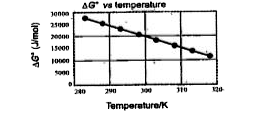For the reaction of ammonium carbonate to produce carbon dioxide and ammonia, an experiment was devised and the results were plotted as in the following diagram:

Which one of the following is consistent with these results?Solution in Malayalam
ΔH∘=−455kJmol−1,ΔS∘=156Jmol−1K−1
ΔH∘=156×103mol−1,ΔS∘=0455Jmol−1K−1
ΔH∘=170kJmol−1,ΔS∘=500Jmol−1K−1
ΔH∘=156×103kJmol−1,ΔS∘=455kJmol−1K−1
Slope of the line (−ΔS∘) can be determined approximaltely as
−ΔS∘=20,000−15000300−310=−500⇒ΔS∘=500JK−1mol−1
Sustituting ΔS∘ in ΔG∘=ΔH∘−TΔS∘at300K gives :
ΔH∘=2000+300×500=170,000J≈170KJ/mol
Topper's Solved these Questions
- CHEMICAL THERMODYNAMICS Book:BRILLIANT PUBLICATIONChapter:CHEMICAL THERMODYNAMICS Exercise:LEVEL-II (Assertion-Reason Type)
Explore 18 Videos
- CHEMICAL BONDING AND MOLECULAR STRUCTUREBook:BRILLIANT PUBLICATIONChapter:CHEMICAL BONDING AND MOLECULAR STRUCTUREExercise:QUESTION (LEVEL -ll)
Explore 42 Videos
- CLASSIFICATION OF ELEMENTS AND PERIODICITY IN PROPERTIESBook:BRILLIANT PUBLICATIONChapter:CLASSIFICATION OF ELEMENTS AND PERIODICITY IN PROPERTIESExercise:QUESTIONS (LEVEL-III ( Linked Comprehension Type ))
Explore 12 Videos
Similar Questions
Assertion : Heat of neutralisation of HNO3, and NaOH is almost same as that of HCl and KOH.
Reason : Both HNO3, and HCl are strong acids and NaOH and KOH are strong bases. : if both (A) and (R) are correct and (R) is the correct explanation of(A)., If both (A) and (R) are correct, but (R) is not the correct explanation of(A)., If(A) is correct, but (R) is incorrect., If both (A) and (R) are incorrect.
View SolutionWhich of the following species are hypervalent ?
(l) ClO−4
(ll) BF3
(lll) SO2−4
(lV) CO2−3
View SolutionThe heats of formation (ΔH∘f) of the oxides of the third period, sodium to chlorine, are in kJ mol−1

Based on these data, answer the following questions
Which oxide has maximum negative heat of formation per oxygen atom?
View SolutionWhich of the following reactions will not result in the formation of carbon- carbon bond?
View SolutionWhich one of the following reaction will not result in the formation of carbonation bond ?
View SolutionWhich of the following reactions will not result in the formation of carbon- carbon bond?
View SolutionWhich among the following reactions will not result in the formation of carbon - carbon bond? _______.
View SolutionWhich one of the following reactions will not result in the formation of carbon - carbon bond?
View SolutionCarbon dioxide produced by combination of fossil fuel is resulting in Greenhouse effect.
View SolutionAn increase in the amount of carbon dioxide results in
View Solutionनिम्न में से कौन सी अभिक्रिया कार्बन-कार्बन बंध के निर्माण में परिणाम नहीं देगी
View SolutionWhich of the following reactions will not result in the formation of carbon-carbon bonds?
View SolutionThe reaction of ammonium hydroxide and carbonic acid results in the formation of
View SolutionGive the chemical equations for the following:
Reaction of ammonia with carbon dioxide.
View SolutionCarbon dioxide traps heat resulting in the ________ .
View SolutionWhich of the following reactions will not result in the formation of carbon- carbon bond?
View Solution